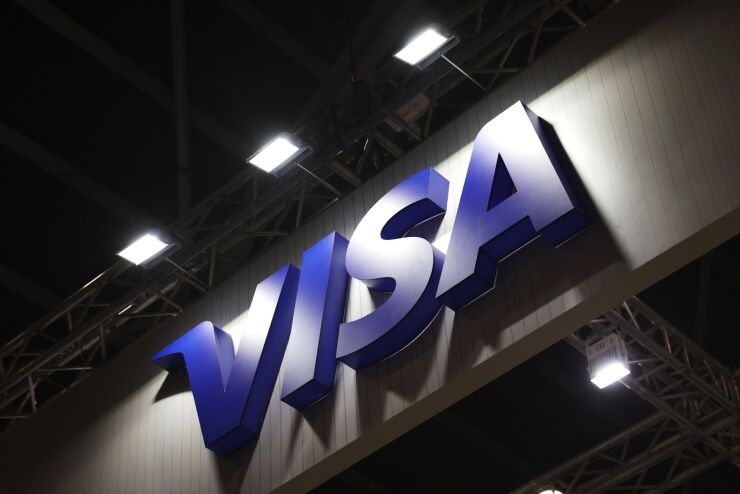
Visa's chief executive insists that the Federal Reserve's instant settlement system's impending launch should not hurt the card network's own real-time payment options.
"The most instructive thing to do is look around the world. The U.K. has had
For the quarter ending March 31, Visa reported net revenue of $7.99 billion, up from $7.19 billion the prior year. It additionally reported earnings per share of $2.09, up from $1.79 the prior year. That beat analyst expectations of $1.99 per share and net revenue of $7.79 billion, according to
Visa's total payments volume in the quarter was $2.96 trillion, which beat Seeking Alpha analysts' expectations of $2.95 trillion and was up from $2.39 trillion the prior year. Visa reports payment volume trends thus far in 2024 are enabling it to affirm its outlook for low-double-digit growth in the next quarter, despite a slowdown in U.S. payment volume in March.
During the earnings call, analysts asked McInerney how FedNow could become a competitive threat. McInerney suggested FedNow could instead be a partner.
"We want to work with any real-time payment network on the planet," McInerney said.

While large banks were initially opposed to FedNow, both the Fed and The Clearing House say they are working together to smooth out any differences. "FedNow will modernize the payment infrastructure in the U.S. It's the smart thing to do, It's the necessary thing to do. And it is good for all Americans," McInerney said.
RTP, which launched in 2018, has more than 300 bank members and covers about 70% of the addressable bank accounts in the U.S. FedNow could reach as many as 9,000 financial institutions and cover nearly all deposits, though that migration is expected to take time, perhaps a year or more.
RTP and FedNow also are not interoperable, so work will be required to ensure the two rails can work together — and with their counterparts in other countries.
Real-time payments could improve account-to-account transfers, remittances, gig-economy payouts and other uses. Visa Direct, which has
"FedNow will take some time to build adoption," McInerney said. "One of the most powerful capabilities in payments is ubiquity. RTP doesn't have that yet. It will happen in the U.S. but it will take time."
Analysts also asked about plans to expand
"It's not easy to get money from one app to another," McInerney said. "It's early days, though we have gotten good feedback. We're initially focused in the U.S. and will go from there."
In a research note, Kevin Kennedy, an analyst at Third Bridge, said it is monitoring how Visa+ extends the card network's infrastructure positioning among digital wallets. "We are particularly interested in its effect on the cross-border and remittance space given the bifurcation of legacy and digitally enabled providers."
While Visa posted strong earnings overall, the card brand said it was monitoring for any impact from an economic downturn or geopolitical shock and is prepared to reassess its investment strategy and prioritization for product development.
"Consumers seem to be broadly scaling back on consumption given the strain of sticky, yet abating, inflation and higher cost of credit," said Kennedy in his research note.
Visa and






